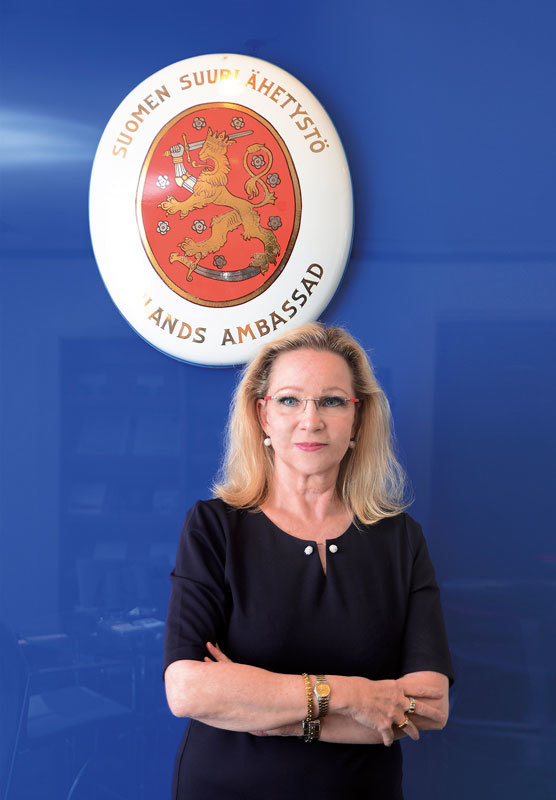H.E. Päivi Hiltunen-Toivio has been the Ambassador of Finland to Indonesia for the past three years. In an interview with NOW! Jakarta, she spoke about the fields of cooperation between the two countries, development policies and sustainability and shared tips for Indonesians who are planning to travel to Finland.

The Finnish Minister of Economic Affairs Mika Lintilä recently visited Indonesia. Could you share with us the highlights and outcome of this visit?
It was a very successful visit, which included 16 Finnish companies from the fields of energy and infrastructure. I think the highlight of the visit were the meetings with several Indonesian ministers as well as the organizing of energy working group meetings that brought together Finnish and Indonesian experts at B2B level. The main outcome of the visit was the impetus that it gave to the implementation of the MoU between Indonesia and Finland in the field of energy. This cooperation already exists for more than 40 years. Most significantly, there was a lot of interest shown by Cleantech companies that came to Indonesia with the Minister and are now doing research on the Indonesian markets and preparing cooperation projects with local partners. We are currently still busy working on the follow-up – that is usually the most important part of such a visit.
You are not only the Ambassador of Finland to Indonesia, but also the Chair of Team Finland. Could you tell us more about the tasks and goals of Team Finland?
Team Finland’s idea is to bring together all state-funded internationalization services in Finland. The aim of the network is to provide Finnish businesses with a service chain that ranges from advice services to financing in Finland and abroad. The network offers tailor-made services for companies’ and investors’ market entry, export efforts, networking and visits. Team Finland has more than 80 local teams in different countries.
In Indonesia, Team Finland consists of the Embassy and Finnish trade promotion office in Jakarta as well as a regional coordinator who is residing outside Indonesia. Recently, we have been active in the field of energy, infrastructure, sustainable development and forestry as well as education and training. For next year, we are planning to focus more on the health sector and digital economy.
Finland was named the most stable country in the world during 2011–2016. How was this achieved?
I think it is a combination of various components that have led to Finland becoming the most stable country. The Finnish society is very much built on a high-class education system where every child has an equal right to basic education – the ethos of “no one is left behind” is very important. Equality in society in general and low levels of hierarchy is the norm in Finland, which in turn can prevent conflicts and increase stability. The level of corruption is one of the lowest in the world. We put great value on an open society, freedom of speech and press, gender equality and a strong rule of law. The government highly invests in research and development, which has led to high technology, a strong innovation culture and a large number of patents. In Finland original and versatile cultural life is vital to human capital and actually does not require huge financial resources.
Scandinavian countries are frontrunners when it comes to sustainability. Finland wants to be a leading country in the implementation of Agenda 2030, the UN’s new sustainable development programme. Where does Finland currently stand, and how do you think Indonesia fares in this regard?
The sustainable development goals of Agenda 2030 are an ambitious transformative effort. The Agenda forces us all to rethink the way we live our lives, not only in developing countries but also in the Western world – we have a shared and individual responsibility to be a part of this agenda.
When it comes to Finland, we were among the first countries to present our implementation plan at the UN forum, maybe also because this is not exactly new to us. The Finnish model includes a wide national sustainable development commission led by the Prime Minister that has been in place since 1993.
I am happy to see that the Indonesian government has also launched the implementation of sustainable development goals and presented its plans at the UN forum. At the same time, I understand that climate change and the sustainable development agenda has been a high priority for the government. To mention a few examples, Indonesia was the first country in the world to gain the EU’s FLEGT license on legal timber and has also established the BRC Peatland Restoration Agency. Furthermore, Indonesia initiated a World Parliamentary Forum on Sustainable Development meeting in Bali last September and will have another chance to showcase its work in Sustainable Development Goals next year when it will host the World Bank and IMF meetings. I think this is a globally visible and promising start for Indonesia in the implementation of the Agenda 2030.
Development policy is an integral part of Finland’s foreign and security policy. What are the priorities for Finland’s development policies in Indonesia?
One of the most important goals of Finnish development policy in Indonesia is partnering with the Indonesian government, civil society and businesses to attain inclusive private sector lead sustainable growth. In this respect, I would like to emphasize partnering and sharing, which means that Indonesia is always in the driver’s seat. In development policy, this is called ownership of the partner organization. It is the most important key for success. We are ready to cooperate to make things happen together.
The projects we have supported in Indonesia include, among others, a project of the Wahid Institute that facilitated women’s participation in establishing an interfaith community laundry service. We have also supported civil society projects that help the local communities to benefit from forests in a sustainable manner, including protecting forests. In Kalimantan, we have supported the conservation and sustainable management of mountain forests in cooperation between WWF Finland and WWF Indonesia.
Finland is a world leader in Cleantech (Clean Technology). Do Finland and Indonesia work together in this field?
According to the environmental performance index 2016, Finland was the greenest country in the world. Cleantech Finland is a concept that offers solutions to environmental and energy efficiency problems, bringing together experts that can introduce fresh ideas and solutions to challenges. Cleantech covers air quality, sustainably produced bio products and materials, clean water, energy and resource efficiency, renewables and smart grid, smart transport and logistics as well as technology to bring value from waste.
Indonesia can benefit from cooperation with Finnish Cleantech companies in many ways. There are already quite a few projects between Finland and Indonesia that include transfer of technology and skills in Cleantech sectors.
It is often said that Finland has one of the best education systems in the world. Are you trying to attract more Indonesians to study in Finland?
We receive more and more inquiries about the possibility of studying in Finland at the Embassy. However, the number of Indonesian students in Finland is still quite low – around 100 students annually. Finland has only recently begun to attract foreign students to come to Finland. Nevertheless, we have been trying to open new channels and encourage Finnish universities and other educational institutions to come to Indonesia learn more about the country and establish a network. Finland and Indonesia have also signed two MoUs in the field of education a few years ago, which are now the basis for our cooperation.
More and more tourists from Indonesia are discovering the beauty of Scandinavia. What would you say are the must-visit places in Finland for travelers?
Finland is a symphony of extremes! Four regions are particularly special, Lapland, Lakeland, the capital Helsinki and the Finnish archipelago, which is the biggest archipelago in Europe. The infrastructure is well developed in Finland, so it is easy to take a road trip by car or train to discover various places across the country and truly experience the nature. Many people who come from big cities say that they can’t believe how quiet it is in Finland.
A must-visit place in my opinion is Lapland, especially in wintertime. It is a magical experience, even to Finns who travel there from the southern part of the country. And don’t forget, you can also visit the real Santa Claus in his village. I just visited Lapland myself in August this year when Finnish Ambassadors from the ASEAN countries participated in a roadshow in different cities in Finland, including Rovaniemi in the North. I haven’t been there for 20 years and was amazed by its beauty. I am planning to go there again with my whole family soon.







